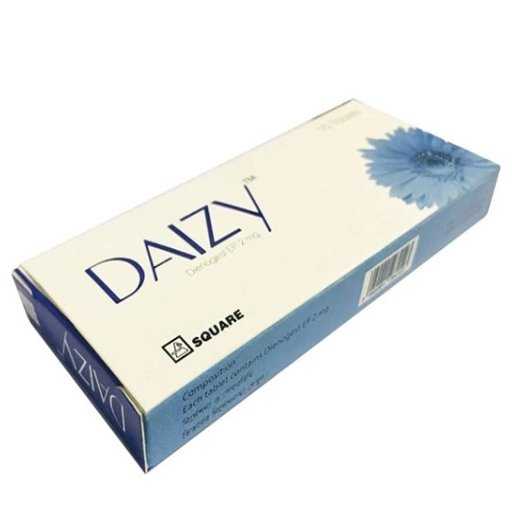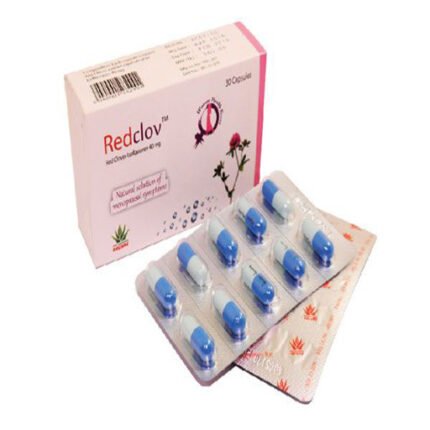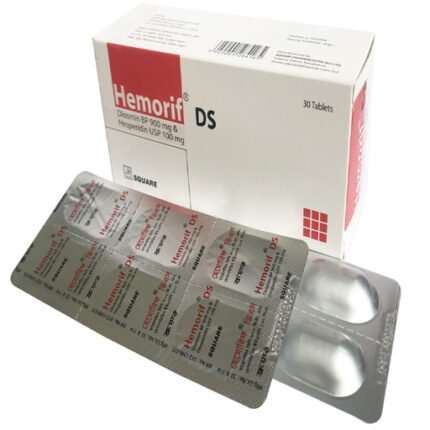Daizy 2
500.00৳ Strip
- Experience relief from endometriosis symptoms with Dienoaest.
- Indicated for treating endometriosis, Dienoaest belongs to the progestin class of medications.
- Reduces estrogen’s effects on endometrial and breast tissue, easing pelvic pain.
- Promotes endometrial atrophy and alleviates symptoms like headache and breast discomfort.
- Convenient daily administration with a 2 mg tablet ensures uninterrupted treatment for effective management.
 Brand
Brand
|
Square Pharmaceuticals PLC |
|---|---|
 Generics
Generics
|
Dienogest |
Indications :
Dienoaest is prescribed for managing endometriosis. Daizy, part of the progestin class of medications, diminishes the impact of estrogen on tissues such as the endometrium (the uterus lining) and breast tissue. By curbing estrogen’s growth effects on the endometrium, Daizy alleviates pelvic pain experienced by women with endometriosis.
Pharmacology :
Dienogest functions as a progesterone receptor agonist (PR) with a potency similar to progesterone but exhibits a robust progestogenic effect in the endometrium, leading to endometrial atrophy over time. It fosters antiproliferative, immunological, and antiangiogenic effects on endometrial tissue. Dienogest lowers endogenous estradiol production, thus suppressing estradiol’s trophic effects on both normal and abnormal endometrial tissue. Continuous dienogest administration induces a hyperprogestogenic and moderately hypoestrogenic hormonal environment, initiating decidualization of endometrial tissue. It also acts as an antagonist at androgen receptors, improving androgenic symptoms like acne and hirsutism.
Dosage & Administration :
Dienogest tablets can be initiated at any point during the menstrual cycle. The recommended dosage is 2 mg daily without interruption, ideally taken at the same time daily with adequate liquid intake. Tablets should be taken continuously irrespective of vaginal bleeding. If a tablet is missed, the woman should take 2 mg as soon as she remembers and continue the next day as usual. If a tablet is not absorbed due to vomiting or diarrhea, it should be replaced with a 2 mg tablet.
Interactions :
Progestogens like Daizy are primarily metabolized by the cytochrome P450 3A4 system. Consequently, inducers or inhibitors of CYP3A4 may affect progestogen drug metabolism. Known CYP3A4 inhibitors such as azole antifungals, cimetidine, verapamil, macrolides, diltiazem, protease inhibitors, and certain antidepressants may elevate plasma progestogen levels, leading to adverse reactions.
Contraindications :
Dienogest should not be used in individuals with hypersensitivity to dienogest or any of its excipients. It is contraindicated in the presence of conditions such as active venous thromboembolic disorder, arterial and cardiovascular diseases, diabetes mellitus with vascular involvement, severe hepatic disease, liver tumors, known or suspected sex hormone-dependent malignancies, and undiagnosed vaginal bleeding.
Side Effects :
Undesirable effects are more common during the initial months of Daizy intake and typically diminish with continued use. Reported undesirable effects include headache, breast discomfort, depressed mood, and acne. Other reported effects encompass nervous system disorders, cardiac disorders, vascular disorders, gastrointestinal disorders, metabolism and nutrition disorders, and psychiatric disorders.
Pregnancy & Lactation :
Limited data exist regarding Dienogest use in pregnant women. Animal studies and data from exposed women show no specific risks to pregnancy, embryonic/fetal development, birth, or postnatal development. However, Dienogest should not be administered during pregnancy due to the lack of necessity for endometriosis treatment during this period.
Dienogest therapy during lactation is not recommended. Physiochemical properties and animal data indicate Dienogest excretion in breast milk. The decision to discontinue breastfeeding or abstain from Dienogest therapy should consider the benefits of breastfeeding for the child and therapy for the woman.
Precautions & Warnings :
Before initiating Daizy treatment, pregnancy must be ruled out. Patients are advised to use nonhormonal contraception methods during treatment if contraception is required. Daizy affects menstrual bleeding patterns and is contraindicated in patients with severe hepatic disease. While ovulation is typically inhibited during Daizy treatment, it is not a contraceptive, and nonhormonal contraception methods should be used if needed.
Use in Special Populations :
Daizy is not indicated for use in children prior to menarche, and its safety and efficacy in adolescents have not been established. There is no relevant indication for Daizy use in the elderly population.
Overdose :
Effects Acute toxicity studies with Daizy indicate no risk of adverse effects in case of inadvertent intake of multiple therapeutic doses. No specific antidote exists for Daizy overdose, and it has been well tolerated even at doses significantly higher than the therapeutic dose over extended periods.
Therapeutic :
Class Female Sex Hormones
Storage Conditions :
Store Daizy in a cool, dry place away from light and out of reach of children.













Reviews
There are no reviews yet.